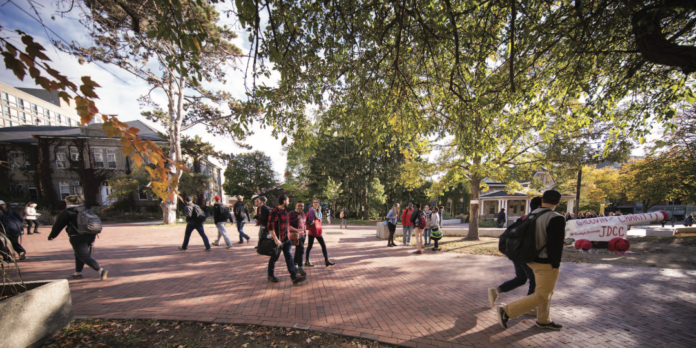University of Guelph student innovators Frazer Seymour in computer science and Jerry Ennett in biomedical engineering, recently worked on separate projects with similar goals. They are using their U of G acquired tech skills to improve lives.
Last year, both young men contributed to inventions that could enhance the enjoyment of life for countless people around the world. Seymour was the programmer for a device that makes it easier for people with dementia to play their favourite music on an iPad.
“Independent access to music for people with dementia is hard, because with something like a record or CD player, they slowly lose the ability to use it,” says Seymour. He helped make the playing of music easier as the co-creator of AMI (Adaptable Music Interface).
Jerry Ennett attributes a highly creative, flexible and hands-on engineering program with getting him stoked about making the world a better place. He developed a fully functioning prosthetic hand using 3D printing technology. Last year, he traveled to India to share his hand printing technology with officials in a medical clinic dedicated to caring for the impoverished.
“I like using cutting-edge tech to help people,” says Ennett.“That’s one of the coolest combinations.”
Since childhood, Melanie Wills had battled an undiagnosed illness. She was well into her doctoral studies at the University of Guelph before she learned what was making her sick.
Chronic pain, severe fatigue, thyroid and vision problems had become a way of life, as did misdiagnoses and unhelpful treatments. She missed a lot of school, spent months in bed.
Despite all of that, Mills came to U of G on a President’s Scholarship and went on to win the University’s most prestigious graduate award for her PhD studies on cell signalling in cancer.
Halfway through her graduate studies, a doctor she had waited over two years to see made the diagnosis all others had missed:Wills had Lyme disease.
The diagnosis opened a whole new research field for her. She co-founded the Canadian Lyme Science Alliance, and now heads the G. Magnotta Lyme Disease Research Lab, named for Gabe Magnotta, co-founder of Magnotta Winery and namesake of a foundation that provided $1.4 million to the U of G lab in 2017.Wills works with other researchers to find biomarkers that could lead to better diagnostic tests and treatment for Lyme. She is living proof of the U of G tagline “Improve Life,” and an example of how the university provides opportunities and makes leaders out of students.
Judy Maddren had a strong goal and a big dream when she came to U of G to study applied science in the late 1960s. She graduated in 1972, determined to become a radio announcer. But she was told that particular job was reserved for men. She should look elsewhere.
But U of G taught Maddren determination, and she persisted. She became a CBC Radio reporter and ultimately one of the national broadcaster’s first female announcers. In 1990, she produced the first public reading of Charles Dickens’s A Christmas Carol. It became a national phenomenon, now with annual readings in more than 100 communities, raisiong millions of dollars for food banks, shelters and hospitals.
“Coming to Guelph gave me opportunities to try things out,” she says.
Drew Cumpson, a graduate of the School of Hospitality, Food and Tourism Management, and a quadriplegic, owns a consulting business that advises restaurants, hotels and airlines on improving accessibility. He started the business after his accident.
In 2011, Cumpson was taking part in a University of Guelph humanitarian trip to Peru when a swimming mishap left him paralyzed from the armpits down. After five semesters away, he resumed his studies. He says he could have transferred to a school closer to home but wanted to stick with what he called U of G’s “best in the nation” hospitality program.
He completed his degree through a combination of distance education and Skype, as well as reliance on students, faculty and staff for help when needed. He now coaches people with disabilities in travel planning, pursuing higher education and managing relationships, and advocates for better health services for people with disabilities.
“My abilities in life have changed, but I still have these other abilities to push forever and work through in life.”
The University of Guelph brings its entire campus community to bear on global problems, weaving collaborations across a number of disciplines and departments to tackle current and future challenges. Helping to feed a growing world population drives a large, interdisciplinary project at “Canada’s food university.”
In late 2016, U of G received $77 million in federal research funding to establish the Food From Thought project, with a focus of finding ways to feed a planet projected to have nine billion human inhabits by 2050.
Growing food in a sustainable way is fundamental to a project that brings together researchers from across campus, further strengthening U of G’s global reputation in agri-food studies.
The long-standing research funding partnership with the Ontario Ministry of Agriculture, Food and Rural Affairs, recently renewed with a 10-year, $713 million commitment, is integral to these efforts, and has bolstered U of G’s reputation as one of Canada’s most inventive universities.
The partnership, established in 1997, has spurred U of G’s innovations that include designing methods for detecting avian flu, inventing the world’s first fully compostable coffee pods, and developing a tool to identify and breed cows with greater disease immunity.
An additional jewel in the university’s agri-food crown is the new Arrell Food Institute, created at U of G in 2017. Created through a $20 million donation from the Arrell Family Foundation, it brings together a broad spectrum of expertise to address food safety, security and sustainability.
Together, Food From Thought, the OMAFRA Agreement, and the Arrell Food Institute buttress U of G’s and Canada’s position as global leaders in agri-food.
The University of Guelph helps create good citizens and strong leaders, providing life-changing moments, leading-edge learning, and opportunities for innovation. It finds solutions to local and global challenges.These qualities make U of G a prestigious place to be for students and researchers alike.
Read the full feature on living, working, and doing business in the City of Guelph through our latest Globe & Mail insert here.
















